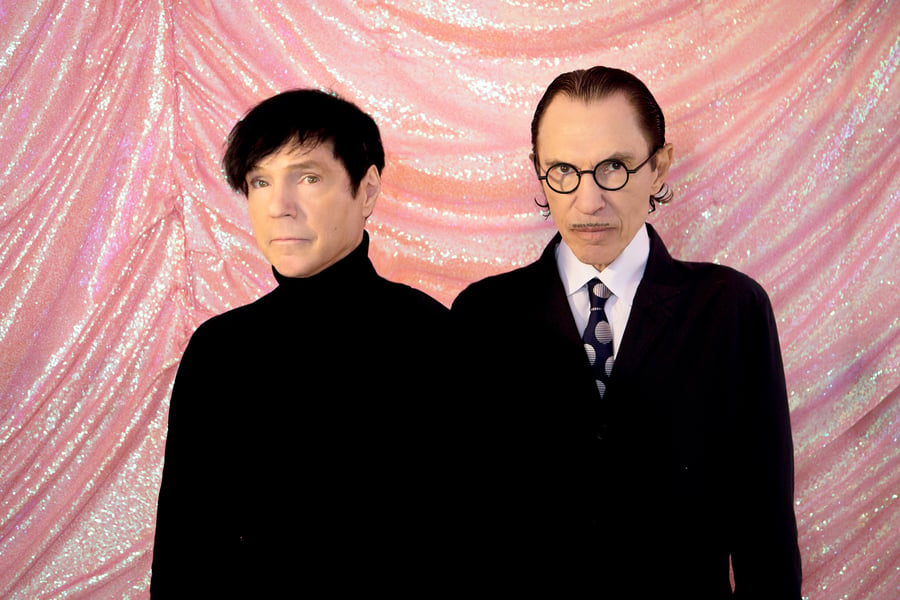In 1979, when Edgar Wright was five years old, he turned on Top of the Pops to find a boyish-looking singer bopping manically in place. A keyboardist next to him stood stock still, sporting floppy bangs and a Hitler-esque mustache, looking alternately bored and angry. The music sounded like a disco LP played at 45 rpm. “If you should die while crossing the street,” the first guy sang in a near falsetto, “The song you’ll hear, I guarantee/It’s number one all over heaven!”
“If I had to describe what that performance was like,” Wright says, “it was a cross between witnessing the Beatles on The Ed Sullivan Show … and seeing the Daleks on Doctor Who.” (You can see it here.) The moment stuck with the future Shaun of the Dead filmmaker enough that when he was going through a retro-glam-rock phase in his teens, he was surprised to find the group’s name — Sparks — among the Bowie and T. Rex cuts on album compilations. Those electro-geeks were also Seventies rock stars? Cut to the Nineties, when Wright started seeing the duo’s video for their Euro-lounge hit “When Do I Get to Sing ‘My Way’ ” on TV. “I kept thinking, ‘Is this the same band I saw 15 years ago?’ ” he recalls, laughing. “‘Why does the singer somehow look younger? What is going on here?’ ”
Decades later, the director has channeled his fascination into The Sparks Brothers, a new documentary that opens on June 18th and dives into how the Southern California siblings Ron and Russell Mael formed a band in the late Sixties and proceeded to work their way through a variety of musical genres: arena rock, prog-rock, proto-punk, electronic dance music, New Wave, “alternative” rock, and classical-influenced chamber pop. While the cult act’s “hits” are few and far between, you can hear their impact on generations of musicians; everyone from Duran Duran to Flea to Franz Ferdinand frontman Alex Kapranos testify in Brothers to Sparks’ influence on their work. Notes Wright, “I think Beck says this in the movie: ‘Sparks were like the bees of music — cross-pollinating everywhere.’ ”
What’s remained constant throughout the Maels’ career has been a wicked sense of humor, a talent for blending off-kilter lyrics with catchy melodies, and the brothers’ personas. Russell is the cute one who crooned about Mickey Mouse on SNL in a sparkly tracksuit; Ron is the deadpan one who danced an old-timey jitterbug to it in a tie. Otherwise, they’re hard to pin down. Wright says he was always being asked by friends and colleagues which album is the best introduction to the ever-morphing band. “It’s like, how do I begin to answer that question?” he says on a Zoom call with Ron, 75, and Russell, 72, in January. “Which Sparks do you want?! The glam one? The New Wave one? The one that’s on the new album?”
“Well, every Sparks album is a new album when it’s the first one you’re hearing,” Ron observes.
“It was easier to make the movie than to keep explaining why they’re such a great band,” Wright adds.
Starting with their early-Seventies records, like Kimono My House, Sparks crafted a bombastic sound that bands like Queen would soon emulate. Their Giorgio Moroder-produced 1979 album, No. 1 in Heaven, introduced synth-pop to the masses years before the Human League and Heaven 17 made it a chart staple. And after L.A. radio station KROQ and the Valley Girl soundtrack helped turn them into Eighties modern-rock heroes, they reinvented themselves as a dance-rock band with hints of what would become techno and electronica. They weren’t ahead of the curve so much as constructing it one batch of wry, weirdly romantic songs (see: the intoxicating promise that “you can take me to the soiree, be so proud of me/Everyone will be impressed, I’ll pass out on your knee” from 1984’s “Pretending to Be Drunk”) at a time. “You can tell when fans discovered them by what album they bring up first,” the director says.
For Wright, stumbling across Sparks’ genre-defying 2002 album Lil’ Beethoven turned him from a casual listener into an obsessive. Still, even he knew little about the famously private band other than the eccentric personalities they displayed in performances. “I didn’t believe Ron and Russell lived on planet Earth,” the director admits. “I assumed they were the J.D. Salingers of rock.” While writing Baby Driver in 2015, Wright went on Twitter and saw “Sparks Follows You.” He DM’d the account, figuring an assistant ran it; Russell quickly replied with, “We love your movies!”
A friendship ensued, and Wright eventually pitched a film that would tie together all their different eras. “We’d been approached before about doing a documentary before,” Russell says. “Only we’re not a band that looks back a lot. And we wanted to keep that sense of mystery surrounding us.”
“But Edgar wanted to treat all of the musical periods with equality,” Ron adds. “And that thing of ‘Oh, they’re the funny band’ — to put the humor into context with the songwriting. We jumped [at] doing it with him.”
The Sparks Brothers connects these disparate versions of the Sparks sound. But it also underlines how the Maels’ ongoing collaboration springs from a singular, two-headed vision — a semi-bruised, bittersweet, and often ironic sensibility that Wright describes as “being in the scene and also standing on the edge of the dance floor, commenting on the scene at the same time.
“I wanted to make a documentary that had the irreverence and seriousness of the band,” he says. “You’re approaching the subject with sincerity and appreciation, but also poking at the format.” Wright pauses. “Like a Sparks song, basically.”
From Rolling Stone US






































